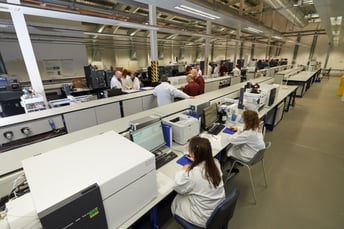National Reference Laboratory for Materials & Articles in Contact with Food
Fera is the UK National Reference Laboratory for Materials and Articles in Contact with Food. Fera acts as National Reference Laboratory under assimilated Regulation (EU) 2017/625.
Our work involves targeted and non-targeted analysis of known and unknown migrants. Analysis can be carried out in complex matrices (foods, food simulants and food contact materials and articles) utilising a range of advanced chromatographic and mass spectrometric techniques including:
- Headspace gas chromatography with mass spectrometry detection (HS-GC-MS)
- Liquid injection GC-MS
- GC with high resolution mass spectrometry detection e.g. GC-(Q)TOF-MS
- Liquid chromatography with high resolution mass spectrometry detection e.g.LC-(Q)TOF-MS
- Inductively coupled plasma (ICP)-MS
Find out more about the Thomson Suite.
One of the largest facilities of its kind in the UK. It is a bespoke laboratory running to GLP quality standards that houses 30 state-of-the-art mass spectrometry instruments.

Materials and Articles in Contact with Food
The term 'food contact material' (FCM) describes any material that may come into contact with a foodstuff. The most obvious example is food packaging but the term also encompasses materials (and articles) used in food processing, transport, preparation and consumption.
These materials may be made from plastic (including recycled), paper/board, rubber, metal, glass, ceramics or biobased materials etc. Many different materials and substances are used during the manufacture of FCMs, to ensure the final product has the desired chemical and physical properties. Any chemical constituents present in the FCM have the potential to transfer to the foods with which they come into contact. In addition, the chemicals present in any adhesives, coatings or printing inks applied to these substrates also have the potential to transfer. This transfer is known as chemical migration.
UK Regulation - Food Contact Materials
Following the United Kingdom’s (UK’s) exit from the European Union (EU), legislation on food contact materials and articles is assimilated in the UK. The overarching legislation applicable to all food contact materials and articles (the Framework Regulation (EC) No 1935/2004) specifies that food contact materials and articles should not transfer their constituents to food so as to endanger health or adversely affect the nature or quality of the food.
The FSA provides guidance on FCM authorisation requirements.
https://www.food.gov.uk/business-guidance/food-contact-materials-regulations
They have information on banned or restricted products such as plastic kitchenware from China and Hong Kong under assimilated Regulation (EU) No. 284/2011, including First Points of Introduction (FPIs).
They also regularly issue guidance to food industry representatives and other stakeholders on a range of topics, often as a result of new regulations coming into force.
EURL-FCM Technical Guidance Documents
- Testing conditions for kitchenware articles in contact with foodstuffs: Plastics, Metals, Silicone and Rubber
- Guidance on sampling, analysis and data reporting for the monitoring of mineral oil hydrocarbons in food and food contact materials
- Guidance for the identification of polymers in multilayer films used in food contact materials
- Practical guidelines on the application of migration modelling for the estimation of specific migration
- Technical guidelines on testing the migration of primary aromatic amines from polyamide kitchenware and of formaldehyde from melamine kitchenware (in support of assimilated Regulation (EU) No 284/2011 on imports from China and Hong-Kong)
- Calculator for the correction of the experimental specific migration for comparison with the legislative limit
- Guidelines for performance criteria and validation procedures of analytical methods used in controls of food contact materials
Food Contact Materials Testing
Food contact materials testing is used worldwide to make sure that food is not contaminated by any of the products it comes into contact with.